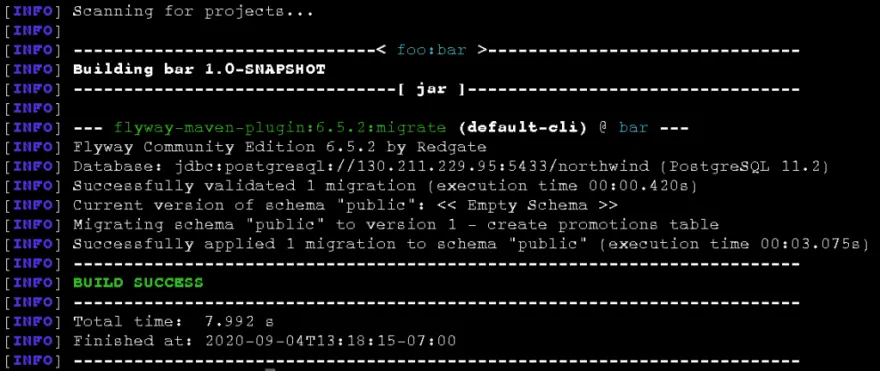Flyway is an open source database version control and migration tool that stresses simplicity and convention over configuration. Changes to the database can be written in SQL (and in some database-specific dialects like PL/SQL and T-SQL) or Java. You interact with Flyway using a command-line client, however there are a variety of plugins that can be leveraged, including Maven, Gradle, Spring Boot, and more.
Supported databases include Oracle, SQL Server, DB2, MySQL, PostgreSQL, and others. Because YugabyteDB is PostgreSQL compatible, most third-party tools and apps will work “out of the box.” Flyway is no exception here. This allows developers to deploy and rollback schema changes to YugabyteDB using Flyway by making use of the PostgreSQL JDBC driver.
Flyway relies on seven commands to manage database version control.
- Migrate: Migrates the schema to the latest version. Flyway will create the schema history table automatically if it doesn’t exist.
- Clean: Drops all objects in the configured schemas.
- Info: Prints the details and status information about all the migrations.
- Validate: Validates the applied migrations against the available ones.
- Undo: Undoes the most recently applied versioned migration.
- Baseline: Baselines an existing database, excluding all migrations up to and including baselineVersion.
- Repair: Repairs the schema history table.
- In this blog post we’ll walk you though the following steps:
- Install a 3 node YugabyteDB cluster on Google Kubernetes Platform
- Install and configure Flyway locally to work with YugabyteDB
- How to run migrations using the Maven plugin
New to distributed SQL or YugabyteDB? Read on.
What Is Distributed SQL?
Distributed SQL databases are becoming popular with organizations interested in moving data infrastructure to the cloud or to cloud native environments. This is often motivated by the desire to reduce TCO or move away from the scaling limitations of monolithic RDBMS like Oracle, MySQL, and SQL Server. The basic characteristics of Distributed SQL are:
- A SQL API for querying and modeling data, with support for traditional RDBMS features like primary keys, foreign keys, indexes, stored procedures, and triggers.
- Automatic distributed query execution so that no single node becomes a bottleneck.
- A distributed SQL database should support automatically distributed data storage. This includes indexes which should be automatically distributed (aka sharded) across multiple nodes of the cluster so that no single node becomes a bottleneck for ensuring high performance and high availability.
- Distributed SQL systems should also provide for strongly consistent replication and distributed ACID transactions. For a deeper discussion about what Distributed SQL is, check out, “What is Distributed SQL?”
#java #open source #database #tutorial #kubernetes #maven #distributed sql #yugabytedb
